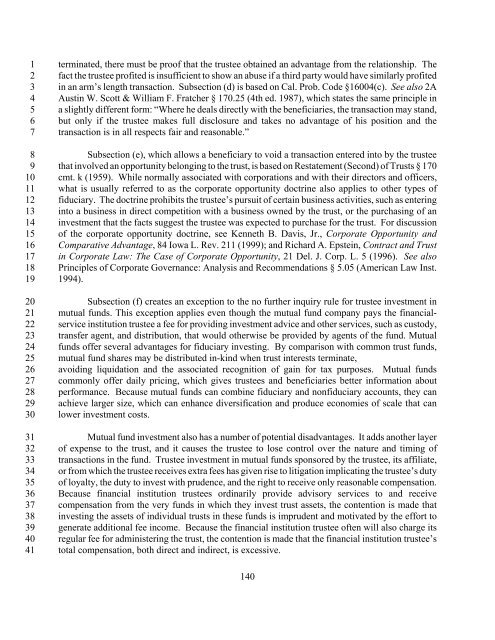uniform trust code - Kansas Judicial Branch
uniform trust code - Kansas Judicial Branch
uniform trust code - Kansas Judicial Branch
Create successful ePaper yourself
Turn your PDF publications into a flip-book with our unique Google optimized e-Paper software.
1<br />
2<br />
3<br />
4<br />
5<br />
6<br />
7<br />
8<br />
9<br />
10<br />
11<br />
12<br />
13<br />
14<br />
15<br />
16<br />
17<br />
18<br />
19<br />
20<br />
21<br />
22<br />
23<br />
24<br />
25<br />
26<br />
27<br />
28<br />
29<br />
30<br />
31<br />
32<br />
33<br />
34<br />
35<br />
36<br />
37<br />
38<br />
39<br />
40<br />
41<br />
terminated, there must be proof that the <strong>trust</strong>ee obtained an advantage from the relationship. The<br />
fact the <strong>trust</strong>ee profited is insufficient to show an abuse if a third party would have similarly profited<br />
in an arm’s length transaction. Subsection (d) is based on Cal. Prob. Code §16004(c). See also 2A<br />
Austin W. Scott & William F. Fratcher § 170.25 (4th ed. 1987), which states the same principle in<br />
a slightly different form: “Where he deals directly with the beneficiaries, the transaction may stand,<br />
but only if the <strong>trust</strong>ee makes full disclosure and takes no advantage of his position and the<br />
transaction is in all respects fair and reasonable.”<br />
Subsection (e), which allows a beneficiary to void a transaction entered into by the <strong>trust</strong>ee<br />
that involved an opportunity belonging to the <strong>trust</strong>, is based on Restatement (Second) of Trusts § 170<br />
cmt. k (1959). While normally associated with corporations and with their directors and officers,<br />
what is usually referred to as the corporate opportunity doctrine also applies to other types of<br />
fiduciary. The doctrine prohibits the <strong>trust</strong>ee’s pursuit of certain business activities, such as entering<br />
into a business in direct competition with a business owned by the <strong>trust</strong>, or the purchasing of an<br />
investment that the facts suggest the <strong>trust</strong>ee was expected to purchase for the <strong>trust</strong>. For discussion<br />
of the corporate opportunity doctrine, see Kenneth B. Davis, Jr., Corporate Opportunity and<br />
Comparative Advantage, 84 Iowa L. Rev. 211 (1999); and Richard A. Epstein, Contract and Trust<br />
in Corporate Law: The Case of Corporate Opportunity, 21 Del. J. Corp. L. 5 (1996). See also<br />
Principles of Corporate Governance: Analysis and Recommendations § 5.05 (American Law Inst.<br />
1994).<br />
Subsection (f) creates an exception to the no further inquiry rule for <strong>trust</strong>ee investment in<br />
mutual funds. This exception applies even though the mutual fund company pays the financialservice<br />
institution <strong>trust</strong>ee a fee for providing investment advice and other services, such as custody,<br />
transfer agent, and distribution, that would otherwise be provided by agents of the fund. Mutual<br />
funds offer several advantages for fiduciary investing. By comparison with common <strong>trust</strong> funds,<br />
mutual fund shares may be distributed in-kind when <strong>trust</strong> interests terminate,<br />
avoiding liquidation and the associated recognition of gain for tax purposes. Mutual funds<br />
commonly offer daily pricing, which gives <strong>trust</strong>ees and beneficiaries better information about<br />
performance. Because mutual funds can combine fiduciary and nonfiduciary accounts, they can<br />
achieve larger size, which can enhance diversification and produce economies of scale that can<br />
lower investment costs.<br />
Mutual fund investment also has a number of potential disadvantages. It adds another layer<br />
of expense to the <strong>trust</strong>, and it causes the <strong>trust</strong>ee to lose control over the nature and timing of<br />
transactions in the fund. Trustee investment in mutual funds sponsored by the <strong>trust</strong>ee, its affiliate,<br />
or from which the <strong>trust</strong>ee receives extra fees has given rise to litigation implicating the <strong>trust</strong>ee’s duty<br />
of loyalty, the duty to invest with prudence, and the right to receive only reasonable compensation.<br />
Because financial institution <strong>trust</strong>ees ordinarily provide advisory services to and receive<br />
compensation from the very funds in which they invest <strong>trust</strong> assets, the contention is made that<br />
investing the assets of individual <strong>trust</strong>s in these funds is imprudent and motivated by the effort to<br />
generate additional fee income. Because the financial institution <strong>trust</strong>ee often will also charge its<br />
regular fee for administering the <strong>trust</strong>, the contention is made that the financial institution <strong>trust</strong>ee’s<br />
total compensation, both direct and indirect, is excessive.<br />
140

















